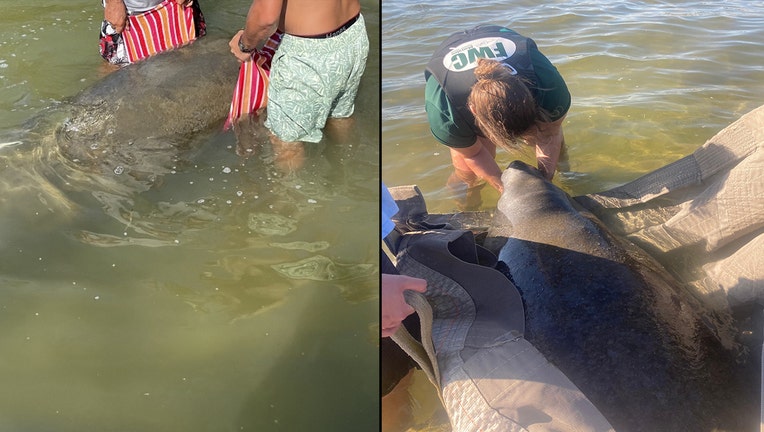Red tide suspected culprit in rescue of 2 manatees in Southwest Florida, FWC says

Florida Fish and Wildlife Conservation Commission staff rescue two manatee, between Feb. 24-26, 2023. [Credit: FWC]
ORLANDO, Fla. - The Florida Fish and Wildlife Conservation Commission (FWC) said two manatees were rescued over the weekend showing signs of lethargy and confusion, possibly as a result of exposure to red tide. Both were transported to SeaWorld Orlando for study and rehabilitation.
Red tides are harmful algal blooms that occur when microscopic algae multiply to higher-than-normal concentrations. The red tide organism is a species known as Karenia brevis, or K. brevis. The organism produces toxins capable of killing fish, birds, and other marine animals such as manatees. The organism may also cause health problems in humans, including respiratory irritation when the toxins become airborne, or when people consume shellfish contaminated with the toxins.
Over the past week, FWC said the red tide organism Karenia brevis was detected in 171 samples from and offshore of Southwest Florida, and one sample from Northwest Florida. Reports of fish kills suspected to be related to red tide were received in Southwest Florida from Pinellas, Manatee, Sarasota, Charlotte, Lee, and Collier counties.
While red tide is a contributing factor in manatee deaths in Florida, the primary cause of mortality in recent years is due to chronic starvation caused by water pollution, according to FWC. Manatee deaths dropped in 2022 from a record high the year before, but Florida wildlife officials said the mortality rates are still a major concern.
Statistics show 800 recorded manatee deaths in 2022, which compares with more than 1,100 in 2021. Both numbers are higher than the average annual deaths of the marine mammals.
This year, between Jan. 1 and Feb. 24, FWC recorded 120 manatee deaths. Necropsies were performed on 63 of those mammals, and it was determined that a dozen of the deaths were due to encounters with watercraft while over half of those were due to natural causes or cold stress.
FWC attempts to perform necropsies on manatees when possible. Depending on the level of decomposition, appropriate samples are collected for analysis to assist in the determination of the cause of death. FWC breaks down manatee deaths into nine categories "based on gross, histological, and microbiological findings," the agency said.
Manatee death categories in Florida
- Perinatal – Manatees less than or equal to 150 cm (5 feet) in total length which were not determined to have died due to human-related causes.
- Cold Stress – Manatees that die as a result of exposure to acute or prolonged cold weather. Animals are usually emaciated and in a general state of malnutrition. (Combined with "Other Natural" in some printouts.)
- Other Natural – Manatee deaths resulting from infectious and non-infectious diseases, birth complications, natural accidents, and natural catastrophes (such as red tide blooms).
- Watercraft – Watercraft-related mortality. Death may result from propeller wounds, impact, crushing, or any combination of the three.
- Crushed/Drowned in Flood Gate or Canal Lock – Manatees killed by crushing or asphyxiation in flood gates and canal locks.
- Other Human-Related – Manatee deaths caused by vandalism, poaching, entrapment in pipes and culverts, complications due to entanglement in ropes, lines, and nets, or ingestion of fishing gear or debris.
- Undetermined; Too Decomposed – Manatee deaths in which the cause of death could not be determined due to an advanced stage of decomposition.
- Undetermined; Other – Manatee deaths in which the carcass was in good condition (fresh or moderately decomposed), but necropsy findings were inconclusive. (Combined with "Undetermined" in some printouts.)
- Verified/Not Necropsied – Manatee deaths that were reported and verified, but a complete necropsy was not performed (Combined with "Undetermined" in some printouts.) Some manatees will still receive varying levels of examination and tissue collection.
If you encounter a sick, injured, dead, or tagged manatee, call FWC's Wildlife Alert Toll-Free Number: 1-888-404-FWCC (3922).

